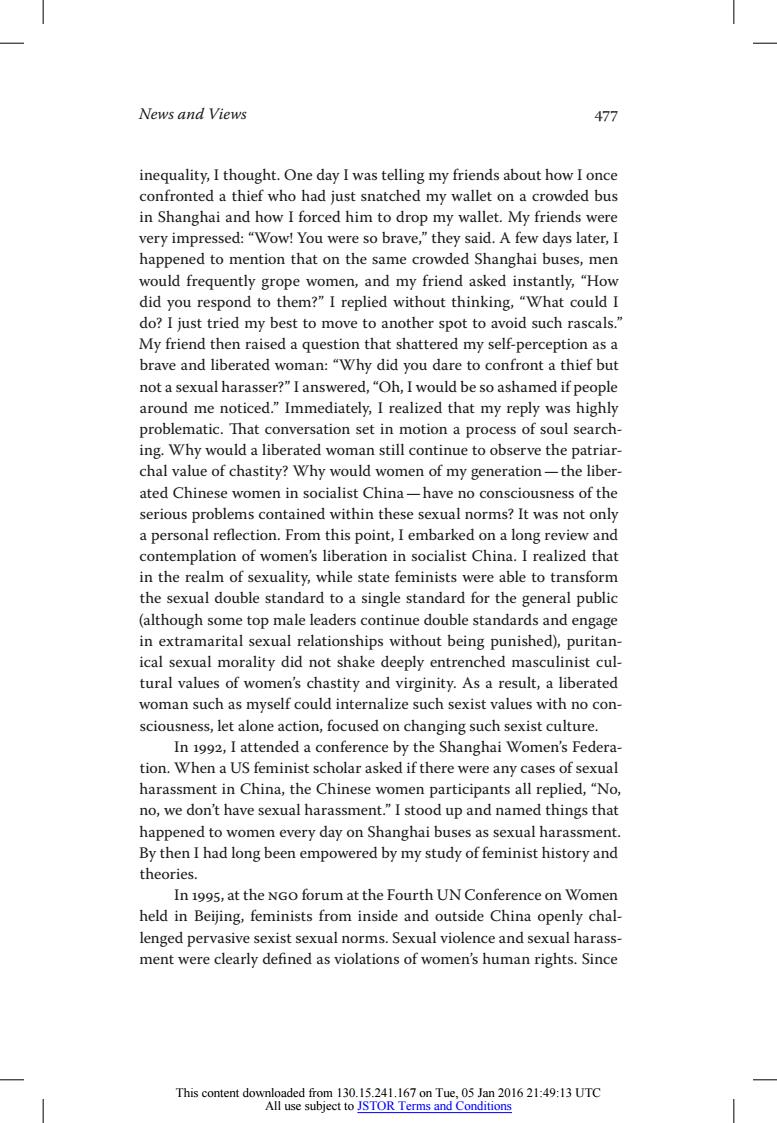正在加载图片...

News and Views 477 inequality,I thought.One day I was telling my friends about how I once confronted a thief who had just snatched my wallet on a crowded bus in Shanghai and how I forced him to drop my wallet.My friends were very impressed:"Wow!You were so brave,"they said.A few days later,I happened to mention that on the same crowded Shanghai buses,men would frequently grope women,and my friend asked instantly,"How did you respond to them?"I replied without thinking,"What could I do?I just tried my best to move to another spot to avoid such rascals." My friend then raised a question that shattered my self-perception as a brave and liberated woman:"Why did you dare to confront a thief but not a sexual harasser?"I answered,"Oh,I would be so ashamed if people around me noticed."Immediately,I realized that my reply was highly problematic.That conversation set in motion a process of soul search- ing.Why would a liberated woman still continue to observe the patriar- chal value of chastity?Why would women of my generation-the liber- ated Chinese women in socialist China-have no consciousness of the serious problems contained within these sexual norms?It was not only a personal reflection.From this point,I embarked on a long review and contemplation of women's liberation in socialist China.I realized that in the realm of sexuality,while state feminists were able to transform the sexual double standard to a single standard for the general public (although some top male leaders continue double standards and engage in extramarital sexual relationships without being punished),puritan- ical sexual morality did not shake deeply entrenched masculinist cul- tural values of women's chastity and virginity.As a result,a liberated woman such as myself could internalize such sexist values with no con- sciousness,let alone action,focused on changing such sexist culture In 1992,I attended a conference by the Shanghai Women's Federa- tion.When a US feminist scholar asked if there were any cases of sexual harassment in China,the Chinese women participants all replied,"No, no,we don't have sexual harassment."I stood up and named things that happened to women every day on Shanghai buses as sexual harassment. By then I had long been empowered by my study of feminist history and theories. In 1995,at the NGo forum at the Fourth UN Conference on Women held in Beijing,feminists from inside and outside China openly chal- lenged pervasive sexist sexual norms.Sexual violence and sexual harass- ment were clearly defined as violations of women's human rights.Since This content downloaded from 130.15.241.167 on Tue,05 Jan 2016 21:49:13 UTC All use subject to JSTOR Terms and ConditionsNews and Views 477 inequality, I thought. One day I was telling my friends about how I once confronted a thief who had just snatched my wallet on a crowded bus in Shanghai and how I forced him to drop my wallet. My friends were very impressed: “Wow! You were so brave,” they said. A few days later, I happened to mention that on the same crowded Shanghai buses, men would frequently grope women, and my friend asked instantly, “How did you respond to them?” I replied without thinking, “What could I do? I just tried my best to move to another spot to avoid such rascals.” My friend then raised a question that shattered my self-perception as a brave and liberated woman: “Why did you dare to confront a thief but not a sexual harasser?” I answered, “Oh, I would be so ashamed if people around me noticed.” Immediately, I realized that my reply was highly problematic. That conversation set in motion a process of soul searching. Why would a liberated woman still continue to observe the patriarchal value of chastity? Why would women of my generation — the liberated Chinese women in socialist China — have no consciousness of the serious problems contained within these sexual norms? It was not only a personal reflection. From this point, I embarked on a long review and contemplation of women’s liberation in socialist China. I realized that in the realm of sexuality, while state feminists were able to transform the sexual double standard to a single standard for the general public (although some top male leaders continue double standards and engage in extramarital sexual relationships without being punished), puritanical sexual morality did not shake deeply entrenched masculinist cultural values of women’s chastity and virginity. As a result, a liberated woman such as myself could internalize such sexist values with no consciousness, let alone action, focused on changing such sexist culture. In 1992, I attended a conference by the Shanghai Women’s Federation. When a US feminist scholar asked if there were any cases of sexual harassment in China, the Chinese women participants all replied, “No, no, we don’t have sexual harassment.” I stood up and named things that happened to women every day on Shanghai buses as sexual harassment. By then I had long been empowered by my study of feminist history and theories. In 1995, at the NGO forum at the Fourth UN Conference on Women held in Beijing, feminists from inside and outside China openly challenged pervasive sexist sexual norms. Sexual violence and sexual harassment were clearly defined as violations of women’s human rights. Since This content downloaded from 130.15.241.167 on Tue, 05 Jan 2016 21:49:13 UTC All use subject to JSTOR Terms and Conditions